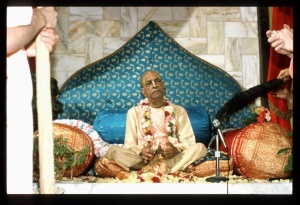SB 1.19.27

A.C. Bhaktivedanta Swami Prabhupada
TEXT 27
nigūḍha-jatruṁ pṛthu-tuṅga-vakṣasam
āvarta-nābhiṁ vali-valgūdaraṁ ca
dig-ambaraṁ vaktra-vikīrṇa-keśaṁ
pralamba-bāhuṁ svamarottamābham
SYNONYMS
nigūḍha—covered; jatrum—collarbone; pṛthu—broad; tuṅga—swollen; vakṣasam—chest; āvarta—whirled; nābhim—navel; vali-valgu—striped; udaram—abdomen; ca—also; dik-ambaram—dressed by all directions (naked); vaktra—curled; vikīrṇa—scattered; keśam—hair; pralamba—elongated; bāhum—hands; su-amara-uttama—the best among the gods (Kṛṣṇa); ābham—hue.
TRANSLATION
His collarbone was fleshy, his chest broad and thick, his navel deep and his abdomen beautifully striped. His arms were long, and curly hair was strewn over his beautiful face. He was naked, and the hue of his body reflected that of Lord Kṛṣṇa.
PURPORT
His bodily features indicate him to be different from common men. All the signs described in connection with the bodily features of Śukadeva Gosvāmī are uncommon symptoms, typical of great personalities, according to physiognomical calculations. His bodily hue resembled that of Lord Kṛṣṇa, who is the supreme among the gods, demigods and all living beings.